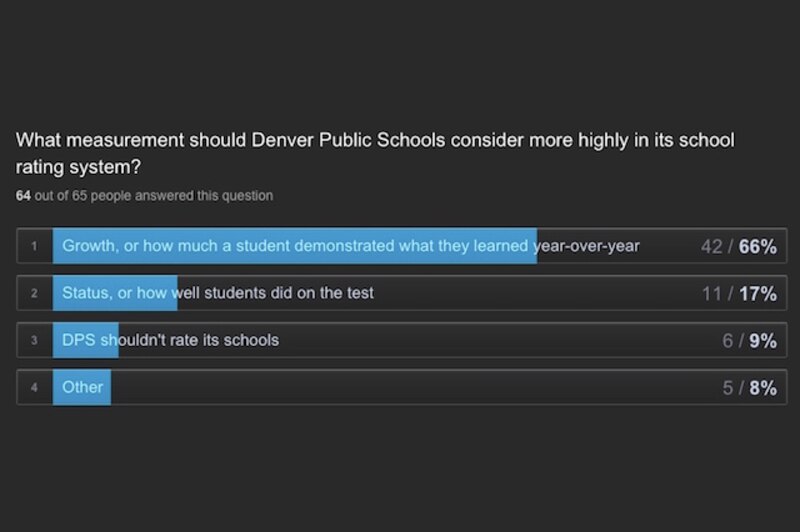On Monday we asked our readers, “What measurement should Denver Public Schools consider more highly in its school rating system?”
Earlier, DPS unveiled how it plans to evaluate its schools during a transition between assessments, and beyond. While schools will continue to be rated mostly on student growth on standardized test scores, a larger chunk of how well a school is doing will be determined by how proficient its students are on those same tests.
Advocates of growth, which measures how much a student learns year-over-year compared to his or her academic peers, say the measurement demonstrates how much a teacher influences a student’s learning regardless of other factors like poverty or whether a student is learning English as a second language. Meanwhile, advocates for status, which measures whether a student is at grade level, stress that growth by itself can mislead the public.
Well, Chalkbeat readers have spoken and most agree with DPS: growth should be the predominant factor in a school’s evaluation.
Here’s a look at how our readers voted:

Readers who chose the “other” option said DPS should develop a metric that evaluates how the school is educating the whole child; for example, are music and art classes available.
Another reader said student and staff satisfaction should be a major factor in determining how a school is rated. (Denver does use staff and student surveys, but those play a very small role in the overall rating.) One reader went a step further and suggested teacher retention should be a major factor.
Meanwhile, Noelle Green (who said she lives outside of Denver) emailed this comment:
School rankings are so misleading. They are more about recognizing those schools that bring up the bottom, rather than true academic achievement. The great schools that consistently out perform every other school in testing and in academic competitions don’t rank as high as the schools that improve on mediocre scores (growth). I notice that Summit Middle in Boulder, which dominates Math Counts and typically score over 85 percent advanced on standardized tests, is only ranked 36 on Colorado School Grades, a nonprofit education reformer organization. Some of the schools ranked highest by US News and World Reports have mediocre test scores and limited curricula and enrichment. Maybe as a whole, we should reevaluate our definition of great schools. My evaluation system would include small class sizes, experienced and qualified teachers, low teacher turnover, a healthy culture with trust and respect, parental involvement, respect for the arts and music, and enrichment.
As always, we invite you to join the conversation on our website, Facebook page, or on Twitter.
